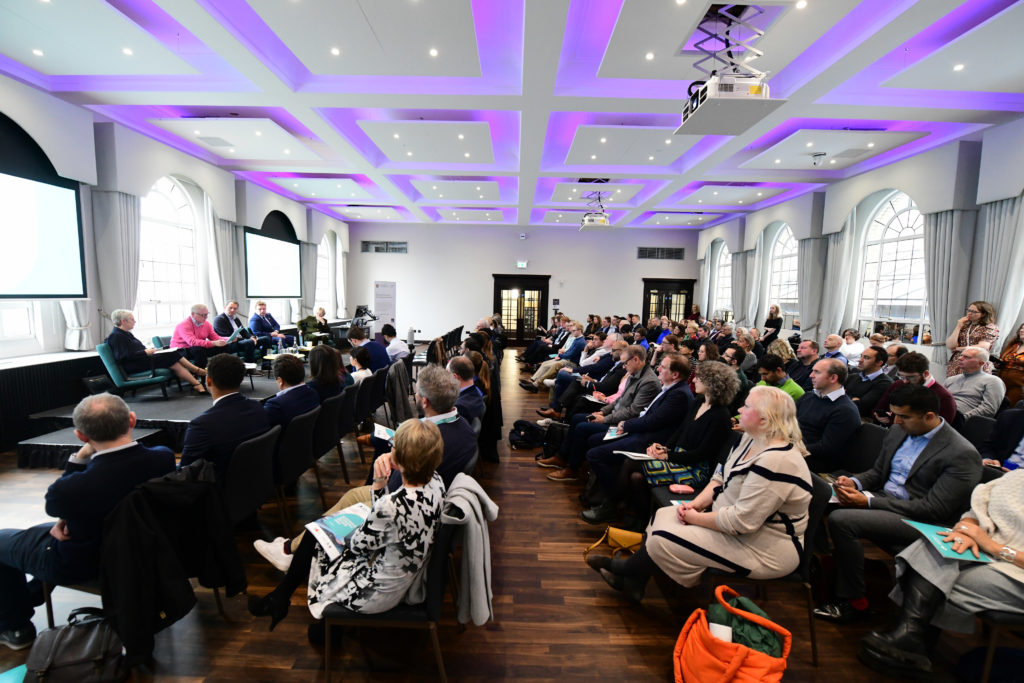
On 26th October 2023, a launch event was held for the Birmingham Economic Review. Chloe Billing provides a summary of some of the key points to come out of the event.
The Birmingham Economic Review (BER) is produced by City-REDI / WMREDI, the University of Birmingham and the Greater Birmingham Chambers of Commerce. It is an in-depth exploration of the economy of England’s second city and a high-quality resource for informing research, policy and investment decisions.
The launch was held at the University of Birmingham’s Exchange building, with over 80 people in attendance. The event opened with a welcome from Professor Adam Tickell, Vice-Chancellor and Principal of the University of Birmingham.
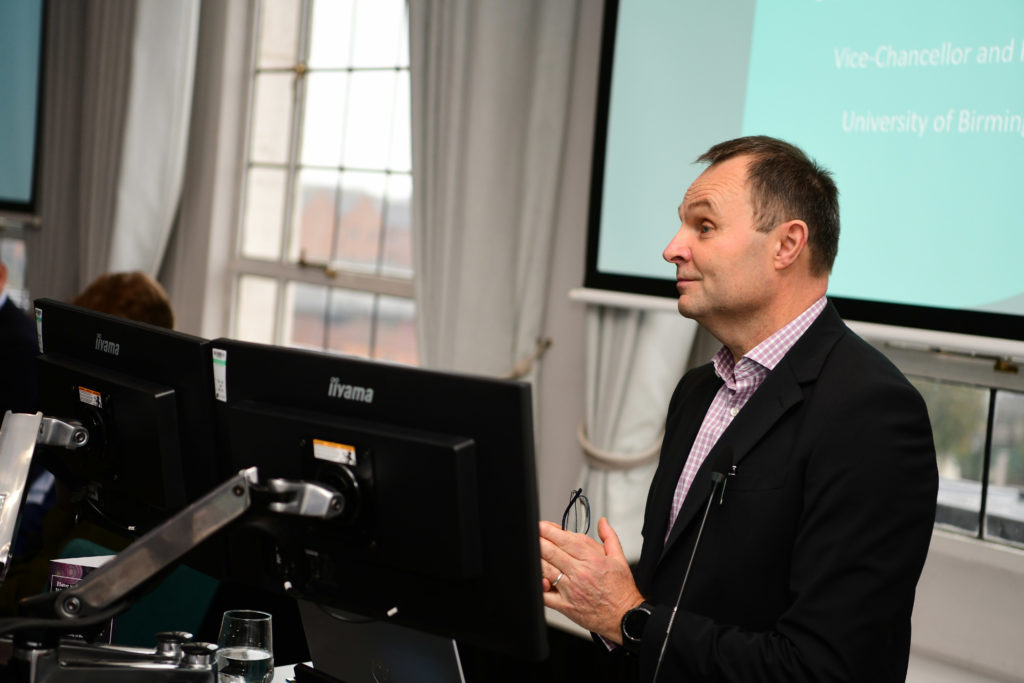
Overview of the Birmingham Economic Review – Professor Anne Green
The BER characterised this year as “2023: A year of resilience”.
First delegates heard from the interim Co-Director of City-REDI / WMREDI, Professor Anne Green, who provided an overview of this year’s BER. Anne delved into the highlights and key issues that have emerged from the latest report. Anne reflected on how the past year has seen a narrative filled with both challenges and opportunities for Birmingham. Her key points were as follows:
High Prices, High Interest Rates, and Low Growth Rates
One of the most significant challenges Birmingham has faced this year is the rise in high prices, high interest rates, and low growth rates. Local businesses have felt the pressure, with some more deeply affected than others. The cost of living and doing business has increased, posing challenges for both entrepreneurs and consumers alike.
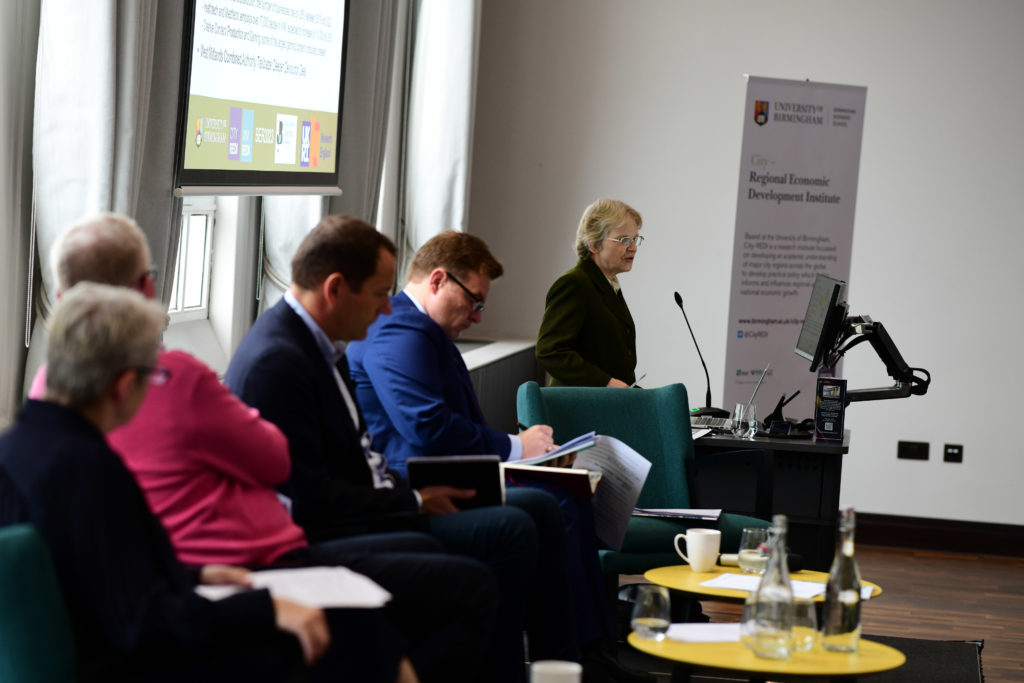
The Labour Market and Emerging Sectors
Despite these challenges, the labour market has shown signs of resilience. There has been an increase in hiring activity, but concerns remain about non-employment and underemployment. The emergence of new and high-growth sectors, particularly in the digital and creative industries, provides hope for the future.
Continuing Economic Shocks and Political Uncertainty
Continuing economic shocks and issues of international and national political uncertainty have added an extra layer of complexity to the city’s economic narrative. Uncertainty can hinder investment and business growth, which requires a nimble approach from local leaders and entrepreneurs.
Supply and Trade Challenges
Ongoing issues with supply and trade, partly due to global disruptions, have impacted Birmingham’s businesses. The ability to adapt and find alternative solutions is crucial in the face of such challenges. Local businesses and policymakers must continue to work together to overcome supply chain disruptions.
Key Stats and Social Concerns
Birmingham contributes significantly to the national economy, representing 2.7% of the national total Gross Value Added (GVA). However, social issues such as households in fuel poverty and the gender pay gap remain pressing concerns. Upskilling and reskilling initiatives have shown progress, promising a brighter future for the city’s workforce.
Business Confidence and Foreign Direct Investment
On a more positive note, high levels of business confidence have remained a constant in Birmingham. The city continues to be a top location for Foreign Direct Investment (FDI) outside of London, underlining its attractiveness as a destination for businesses looking to expand.
Economic Sectors and Megatrends
The financial and professional services (BPFS) sector is the largest in the city region, while advanced manufacturing, although the largest, has experienced some shrinkage. The reshoring of manufacturing offers opportunities for growth. The hospitality sector has been hit hard, underscoring the need for resilience and adaptation.
Looking to the Future
As Birmingham prepares to respond to the challenges posed by megatrends like technology, AI, climate change, and an evolving population structure, it is essential to assess the city’s assets, competitive advantages, and vulnerabilities. The city should define its preferred future and make the most of opportunities for place-based policies.
Reflections and Expectations
In the next 1-3 years, we can expect Birmingham to continue adapting to these dynamic economic changes. The city’s ability to respond to crises and capitalize on emerging opportunities will shape its economic trajectory. As we navigate this landscape of challenges and opportunities, one thing is clear: Birmingham remains a resilient and dynamic city, poised to overcome obstacles and thrive in an ever-evolving global economy.
Chair and the Panel Members
Professor Green then passed over to Deb Leary, Chair of the event and President of the Greater Birmingham Chambers of Commerce, who introduced the members of the panel:
- Professor Anne Green, Professor of Regional Economic Development, University of Birmingham
- Councillor John Cotton, Leader, Birmingham City Council
- Andrew Bostock, KPMG senior partner
- Mike Owens, Shumacher Packaging UK
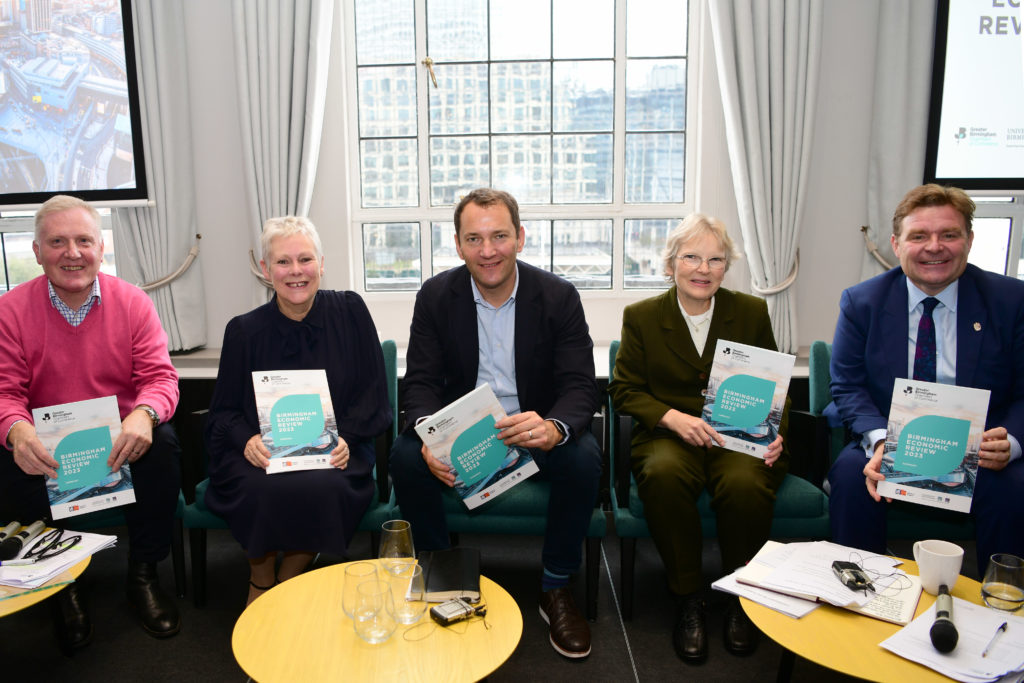
Councillor John Cotton: collective vision and working in partnership
Councillor John Cotton emphasised that collective vision and working in partnership is needed across the sectors to tap the potential of the city region. A summary of his reactions to the report is below:
Birmingham, often described as the heart of the West Midlands, is experiencing a challenging time. City councils across the nation are collectively facing a host of complex issues. However, amidst these challenges, Birmingham remains open for business, and the city’s true potential shines through. For example, despite the hurdles, Birmingham has seen record levels of Foreign Direct Investment (FDI) and a surge in visitor numbers.
John reflected on how Birmingham holds a special place in the hearts of those who have lived here for generations. The deep passion for this place, with its rich history and diverse population, is evident in the way the people cherish it. It’s more than just a city; it’s home. He stressed that Birmingham possesses a wealth of untapped potential. To truly thrive, we must connect the city’s diverse communities with opportunities for growth. This collective effort will unleash Birmingham’s full potential and create a more inclusive and prosperous future.
John emphasised how our youth are a great strength, but skills attainment remains below average, leading to underemployment and the highest levels of structured unemployment. Nurturing the talents of our younger generation is essential for the city’s future success. Nevertheless, health and life outcomes are significant drivers of social disparities, with one in five residents living in fuel poverty. Birmingham must address the decade-long gap in life expectancy between the wealthiest and poorest. This challenge demands collective action to overcome fundamental social and economic issues.
John discussed how the arrival of HS2 at the end of the decade is an exciting opportunity for Birmingham, even if some had hoped for a more central location. The city must ensure that the benefits of this growth opportunity are shared more broadly among its residents. Regeneration projects like the Commonwealth Games, Longbridge, Smithfield, and more demonstrate that Birmingham’s growth is ongoing. These initiatives hold the promise of a brighter future and signify the city’s enduring appeal.
He called for Birmingham’s success to be measured by its impact on the people who call it home. Unleashing untapped productivity and potential is a collective endeavour that spans sectors and communities. John argued that by working together, sharing our passion, and tapping into our collective potential we can overcome the challenges we face and build a brighter future for Birmingham and its residents.
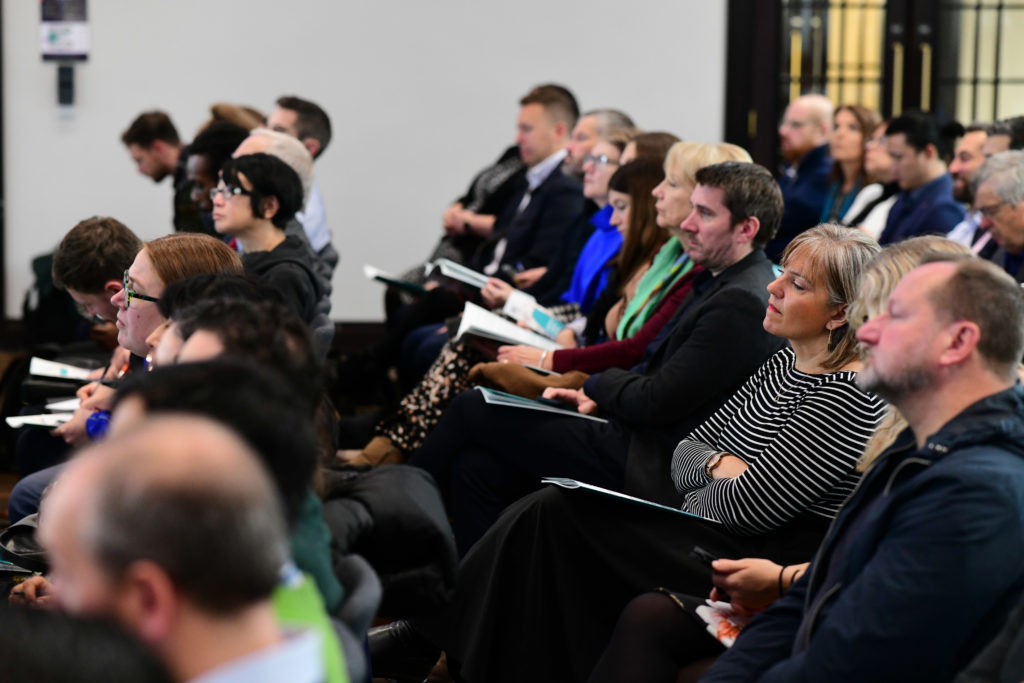
Andrew Bostock: Navigating Birmingham’s Post-COVID Business Landscape
Andrew Bostock pointed out the responsibility of business leaders during the time of uncertainty. He reflected on the Birmingham business landscape post-COVID as a mixed picture. While there have been promising signs of growth in sectors like audit, tax, and digital, business uncertainty remains a challenging concept.
He shared how in the wake of the pandemic, KPMG Birmingham has witnessed real growth in specific sectors such as audit, tax, and digital. However, challenges still loom, and uncertainty continues to affect businesses, making it essential to address these issues collectively. Andrew explained why this is an issue since uncertainty can be a hindrance to growth and investment. Businesses thrive in stable environments, and the concept of business uncertainty can deter both local and international investors. Birmingham needs a renewed sense of confidence and positivity to boost its economic prospects.
He reflected on how Birmingham is a city with much to offer, but it often finds itself overshadowed by negative narratives. To unlock its potential, the city must raise its voice and share its success stories. Positivity and confidence can go a long way in attracting investment and business opportunities.
Andrew reinforced John’s point that HS2 presents a significant opportunity for Birmingham. However, the city must create the conditions that attract FDI and encourage investment. Birmingham’s growth prospects and the associated job opportunities depend on effectively leveraging HS2 and securing investments. Rooting for local talents who have strong ties to the city can help ensure a more stable workforce.
Andrew finished with three key points on what he thinks Birmingham needs:
- Transportation Upgrades: Birmingham’s transportation infrastructure needs improvement to reduce the drag on productivity. Enhancing connectivity within the city and beyond is essential for its economic growth.
- Devolution: Advancing devolution efforts is crucial to empower Birmingham with more decision-making authority over its policies and investments.
- Inward Investment and Capital Access: Birmingham must actively pursue inward investment and make access to capital more readily available to support business expansion and innovation.
Mike Owens: A City of Purpose and Challenges
Mike Owens, Shumacher Packaging UK, reflected on how Birmingham, a city teeming with vibrancy and ambition, has given many of us a sense of purpose and involvement. Yet, to Mike Birmingham is also a city in transition, where transience is palpable. Students, the arrival of HS2, and job opportunities all contribute to the city’s ever-changing urban landscape.
He reflected on how Birmingham’s makeup is a stark contrast between affluence and deprivation. For example, taking his office as an example, in close proximity to Birmingham Airport, you have the affluent Solihull to the south. Yet, to the north, areas like Chelmsley Wood grapple with significant deprivation, touching on issues of education, poverty, and health.
Mike further emphasised how alarming Birmingham’s key statistics are. It’s the 7th most deprived local authority in England, with three of the largest cities in the UK among the most deprived. Moreover, 13 out of 14 of the most deprived areas in England are located north of Birmingham. This stark contrast between the city centre and its outskirts is reflected in crime statistics, where 11 out of the 14 most deprived areas rank in the top 7 for crime rates.
Mike took from this year’s Birmingham Economic Review that deprivation is Birmingham’s most pressing problem. Approximately 40% of children in the Birmingham area live in poverty, a statistic that demands urgent attention. It’s clear that we need to realign and become more efficient in the allocation of our resources to address this critical issue.
To Mike, everything is connected to everything else. To truly tackle these challenges, we need to invest in better transportation and infrastructure, ensuring that people can get to work without being bogged down by traffic. Amid these challenges, however, Birmingham still holds an aura of opportunity. With 58% of business confidence, the city has the potential to shine. But we must identify and invest in the top 20 projects that will not only contribute to economic growth but also make a meaningful difference in areas like Chelmsley Wood.
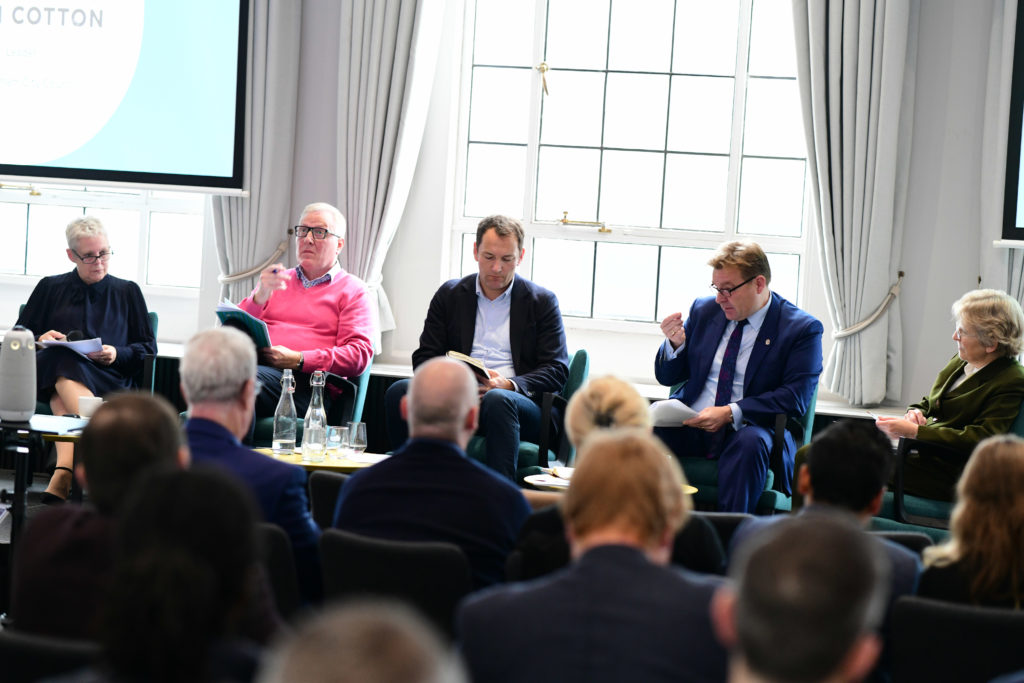
Mike finished by stating that ‘Birmingham is a city of purpose, involvement, and ambition’. However, it is also a city of stark contrasts and pressing challenges. To unlock its full potential and address its problems, collaboration and involvement across sectors are essential. It’s time to harness the vibrancy of this city and turn it into an engine for positive change, ensuring that Birmingham’s opportunities are accessible to all, regardless of where they reside within its diverse boundaries.
Question Time
Questions were then invited from the audience members. A summary of the panellists’ responses is outlined below:
Economic Conditions and Consumer Confidence
Mike highlighted the impact of economic conditions on his business, with a significant drop in demand leading to operating losses. Consumer confidence and spending patterns play a critical role in this, reflecting the broader economic challenges faced by businesses.
Meanwhile, Andrew observed that his company (KPMG) has seen a mixed picture, with technology, digital transformation, and innovation experiencing significant growth post-COVID. However, uncertainty affects different sectors, and businesses must navigate short-term challenges, such as the cost-of-living crisis. Resilience and adaptability are key in this ever-changing landscape.
John Cotton acknowledged the financial challenges faced by Birmingham, which are not unique but resonate with local authorities across England. Rising costs and inflation compound the issues, and this is reflected in the necessity to issue Section 114 notices. The equal pay liability of £750 million presents an additional significant challenge.
Anne emphasizes the need to embrace innovation, adaptability, and everyday innovation. Birmingham has demonstrated its potential and resilience, showing that it can overcome challenges and seize opportunities.
Skills Attainment and Economic Inactivity
A discussion was then had on the issue of economically inactive individuals who choose not to work. Reasons include poor health, waiting lists in the healthcare system, and the need for flexible work options. To encourage their re-entry into the workforce, a re-evaluation of work-life priorities and the creation of flexible, quality job opportunities are necessary.
Streamlining Investment and Cancelation of HS2
The panellists discussed the need to streamline investments into specific sectors to create more meaningful and sustainable impacts. The cancellation of HS2 raises questions about regional connectivity. While Birmingham retains its central location, investments need to focus on intra- and inter-regional links to address regional inequalities.
Decarbonization and Sustainability
Sustainability is at the core of many businesses’ strategies, with efforts to reduce carbon footprints and reduce waste. Andy highlighted the importance of sustainability and social responsibility, particularly in manufacturing. Sustainability is not just a choice but a necessity.
AI and the Cultural Economy
AI presents opportunities and challenges. It can enhance productivity but also poses risks, including data ownership and cybersecurity concerns. John highlighted the potential of AI in public service delivery, emphasizing the importance of data sharing and collaboration.
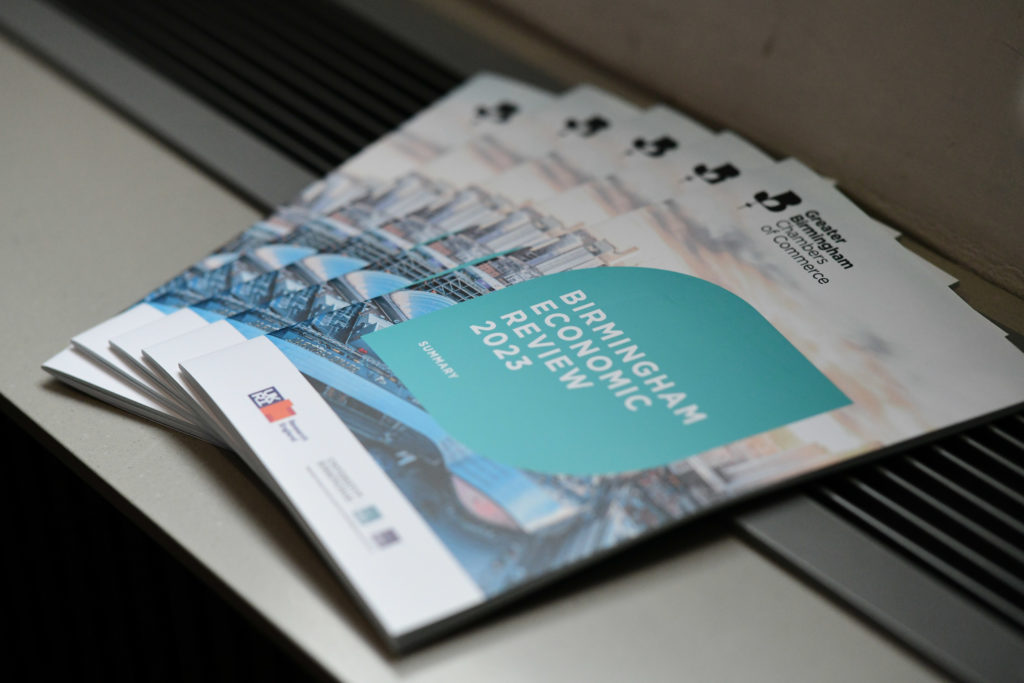
The Cultural Economy and the Commonwealth Games
The cultural economy is fundamental to Birmingham’s identity and its attractiveness to residents and visitors. The Commonwealth Games offered a unique opportunity to showcase Birmingham on a global stage and build on positive sentiment. The city must capitalize on this event to increase its global visibility and celebrate its unique character.
Conclusion
The discussions had at this year’s BER event capture the essence of Birmingham’s economy, highlighting its resilience, adaptability, and a shared commitment to sustainability and positive change. Challenges exist, but the people of Birmingham, represented by the panellists, are poised to embrace opportunities and address complexities collaboratively and dynamically. As Birmingham continues to evolve, it can leverage its strengths and vibrant cultural economy to shine on the global stage.
This blog was written by Dr Chloe Billing, Research Fellow, City-REDI / WMREDI, University of Birmingham.
All images from the event are from Jas Sansi.
Disclaimer:
The views expressed in this analysis post are those of the authors and not necessarily those of City-REDI / WM REDI or the University of Birmingham.

It is quite bizarre that none of the speakers, specially Cllr John Cotton made no reference to the bankruptcy of the Municipality of Birmingham, which will have a significant impact on growth and employment in the city.